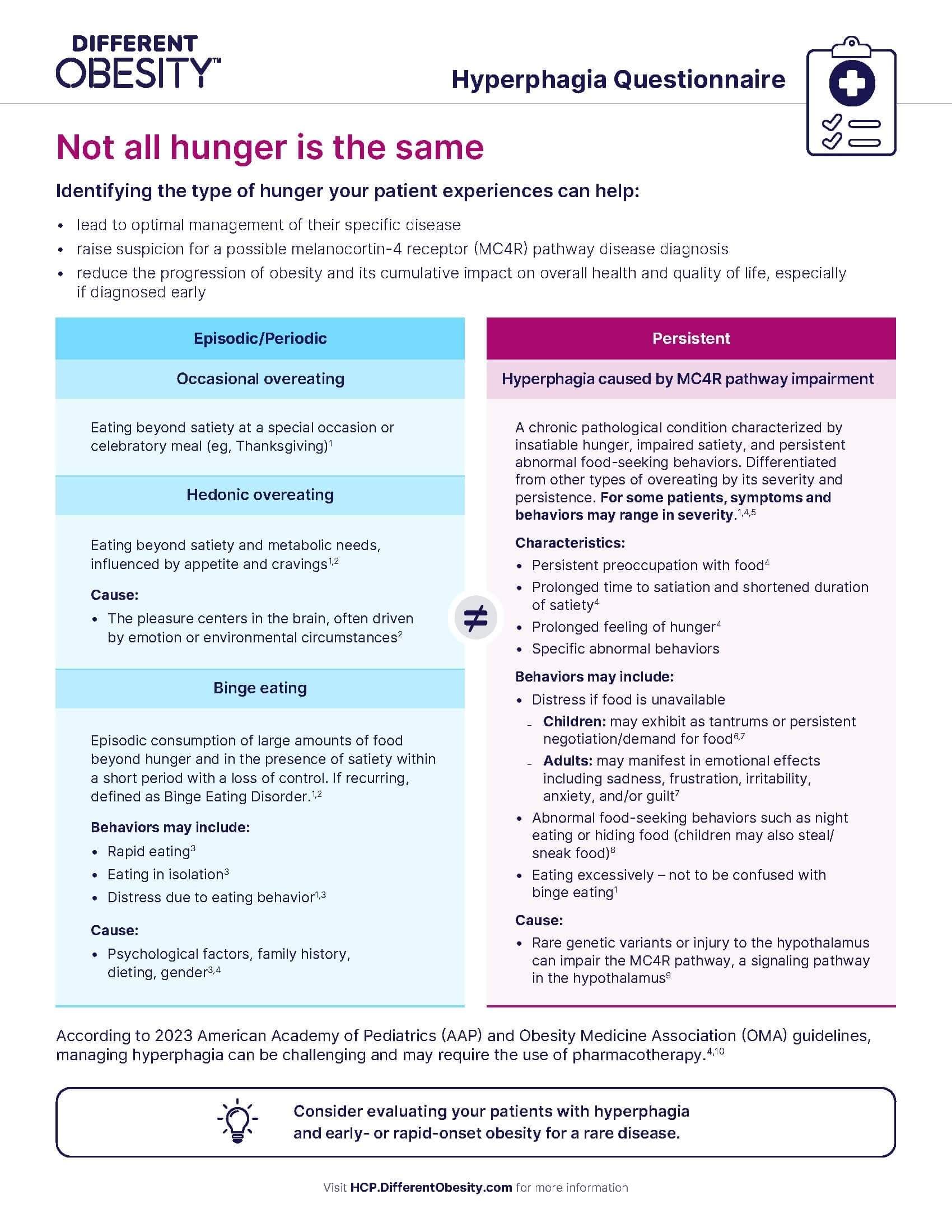Hyperphagia and obesity
The significant burden on people living with BBS
Hyperphagia and obesity can be among the most distressing symptoms of BBS1,2
While Bardet-Biedl syndrome (BBS) is syndromic with multiple and variable signs and symptoms, hyperphagia and early-onset obesity caused by impairment in the MC4R pathway are key differentiators from other causes of obesity.3

Occurrence: Impairment is present at birth and leads to hyperphagia (insatiable hunger) and early-onset obesity3,4
- May develop as young as 2 years old, often appearing in early childhood and continuing into adolescence and adulthood3,5
Cause: Rare genetic variants in the MC4R pathway, a signaling pathway in the hypothalamus3
Hunger due to MC4R pathway impairment is different from typical hunger
Episodic/Periodic
Occasional overeating
Eating beyond a feeling of satiety at a special occasion or celebratory meal (e.g., Thanksgiving).6
Hedonic overeating
Eating beyond satiety and metabolic needs. Influenced by appetite and cravings or having a preoccupation with food (e.g., "food noise").6-8
Cause:
- The pleasure centers in the brain, often driven by emotion or environmental circumstances7
Binge eating
Episodic consumption of large amounts of food beyond hunger and/or satiety within a short period with a loss of control. If recurring, defined as Binge Eating Disorder.6,7
Behaviors:
- Rapid eating9
- Eating in isolation9
- Distress due to eating behavior6,9
Cause:
- Psychological factors, family history, dieting, gender4,9
Persistent
Hyperphagia caused by MC4R pathway impairment
A chronic pathological condition characterized by insatiable hunger, impaired satiety, and persistent abnormal food-seeking behaviors. Differentiated from other types of overeating by its severity and persistence. For some patients, symptoms and behaviors may range in severity.4,8
Characteristics4:
- Persistent preoccupation with food
- Prolonged time to satiation and shortened duration of satiety
- Prolonged feeling of hunger
- Specific abnormal behaviors
Behaviors:
- Distress if food is unavailable
- Children: may exhibit as tantrums or persistent negotiation/demand for food2,10
- Adults: may manifest in emotional effects including sadness, frustration, irritability, anxiety and/or guilt2
- Abnormal food-seeking behaviors such as night eating or hiding food (children may also steal/sneak food)11
- Eating excessively—not to be confused with binge eating6
Cause:
- Rare genetic variants in the melanocortin-4 receptor (MC4R) pathway, a signaling pathway in the hypothalamus3
Genetic testing through the Uncovering Rare Obesity® program is available for eligible patients.
The severity and presentation of the symptoms and behaviors associated with hyperphagia may vary by patient.8
Burden of hyperphagia
For some patients, hyperphagia may be among the most upsetting symptoms of BBS and has a significant impact on the daily lives of patients and their caregivers.1,2

“The most challenging symptom (of BBS) was hyperphagia. We did not anticipate the severity of the hunger. It is much more intense and ever-present, and impacted everything we did.”
– Caregiver of an individual living with BBS
Impact of hyperphagia on daily life2
Caregivers of patients with BBS reported moderate or significant impacts of hyperphagia on daily life:
Familial relationships
Sleep
Mood/emotion
Concentrating in school
Leisure
Downloadable
Identify hyperphagia in your patients with early-onset obesity and intense hunger.
Burden of obesity
BBS is a progressive condition with long-term health complications. Patients with BBS and their caregivers report substantial burden related to obesity, including a negative impact on their emotional well-being, mental health, social life, and family relations, which may be a result of the early-onset and progressive nature of obesity due to BBS.1,2
Obesity due to BBS has been reported in children as young as 2 years old.12
The prevalence of obesity increases year over year in people with BBS. Nearly 93% are categorized as having overweight or obesity by early childhood.13
Because of early-onset obesity and continual hyperphagia, many patients develop other comorbidities, which in turn can have a further negative effect on overall clinical and mental health.1,4,13
Long-term effects of obesity-related sequelae in patients with BBS1,4,13
- Diabetes
- Cardiovascular disease
- Kidney failure
- Hypertension
- Metabolic dysfunction-associated fatty liver disease
- Overall negative impact on clinical and mental health
Renal anomalies due to BBS can be impacted by early-onset obesity, further compounding renal impairment.
